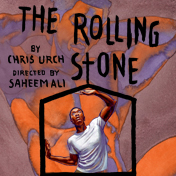
Chris Urch's The Rolling Stone, currently making its debut at the Mitzi E. Newhouse Theater at Lincoln Center Theater, has nothing to do with rock music or the magazine world. It is a poignant look at Uganda's attack on homosexuals that centers on its effects on a Christian, church-going community in Kampala. While the book emotionally accesses the mind, it is the actors who strike the soul with strong, searing and searching performances. The attack on LGBTs was precipitated by the British and U.S. missionaries who influenced Uganda's houses of worship. Increasing in recent decades, homophobia boiled over when a small Kampala newspaper, "The Rolling Stone," ran photos of alleged gays in the country, demanding "Kill Them!" Inevitably, this is a reminder of Arthur Miller's The Crucible, and its church-instigated attacks on suspected witchcraft. The focus zones in on a romance between Dembe (Ato Blankson-Wood) and his Irish-Ugandan lover, Sam (Robert Gilbert), and the discriminatory effect their same-sex love has on Dembe's close-knit family and church. When a respected pastor dies, his eldest son, Joe (James Udom), steps into his father's leadership place in the church and in the family, including Joe's younger brother, Dembe and sister Wummie (Latoya Edwards). Both Dembe and Wummie are studying medicine and share a close, protective relationship. A friend and neighbor whom they call Mama (Myra Lucretia Taylor), is a strong influence in the church and urges Joe to emphasize the increasing homophobic antagonism. She has a young daughter, Naome, portrayed with fragility by Adenike Thomas. Naome has suddenly became mute and Mama depends on Pastor Joe to spiritually cure her, while hoping that Dembe will marry the girl. As for Dembe, aged 18, but he is in love with Sam. At the top of the play the two men are sitting in a boat as Sam urges Dembe to leave Uganda and travel with him to Derry in northern Ireland where they can live safely. The discriminatory atmosphere is already dangerous for them in Uganda. While there are suspicions about Dembe by some, his homosexuality is hidden within a desperate private battle between sexuality and the young man's love for family and church. As the new pastor, Joe heats up his castigation against the "gross indecency" of homosexuality, persuading followers to join the increasingly frenzied movement. As the fervor rises to hysterical maliciousness it threatens the family closeness, pitting Joe against Dembe who is supported by the exuberant and dedicated Wumma. It reaches a climax after one homosexual activist, David Kato, is attacked and killed in his home and the newspaper publishes photos of local suspected homosexuals, including Dembe. The community rises in retribution. The reaction of the family, Joe, Wummie and Dembe is fear, anger, love for each other and finally determination. They throw out Bible verses at each other, trying to prove their disparate beliefs until finally, at the end, Dembe makes a decision. Directed by Saheem Ali, the performances are strong, particularly the major focuses on Udom as the commanding new pastor, Joe, and young Dembe, played by Blankson-Wood with touching nuance. Yet, many of the characters are not portrayed in depth. For example, When Mama tells the reasons for Naome's sudden silence, it does not involve Dembe or even homophobia. The show is set on a blank stage by Arnulfo Maldonado, with spaces crafted to indicate different locations, the church, home, lake. The deep orange backdrop is enhanced with water sketches of waves and Japhy Weideman's well-designed lighting. Costume designer, Dede Ayite dresses Pastor Joe in an ill-fitting black suit and Dembe is locally teased about his bright shirts. Justin Ellington's original music and traditional religious humns ("Nearer My God To Thee" and "Down By the Riverside") add a gospel revival feel. Chris Urch's The Rolling Stone is inspired by a true story about a Ugandan newspaper of the same name that had recently emphasized urged publicizing and killing alleged homosexuals. The problem of Urch's gripping play is the assumption that viewers are familiar with the Ugandan or that they have read the small addendum in the Playbill. Stressing the universality in Urch's story are similar attitudes continuing today, fury and distruction augmented by inner battles of faith and sexuality. Thanks to the talented cast, the play delivers an impassioned message.
